英语禁忌语
- 格式:doc
- 大小:216.50 KB
- 文档页数:19
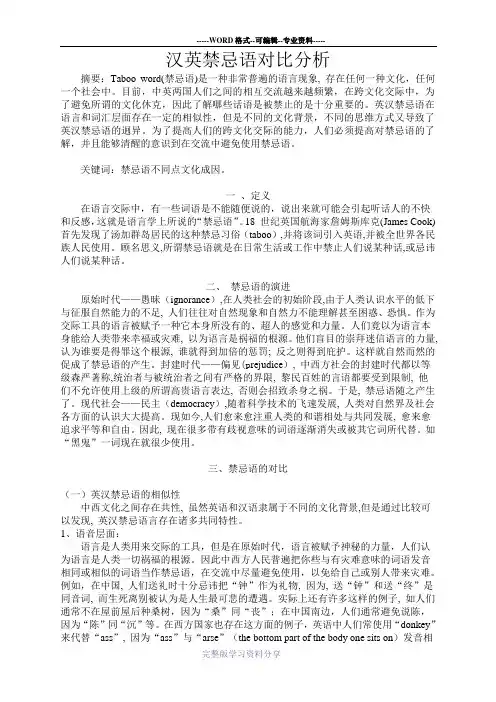
汉英禁忌语对比分析摘要:Taboo word(禁忌语)是一种非常普遍的语言现象, 存在任何一种文化,任何一个社会中。
目前,中英两国人们之间的相互交流越来越频繁,在跨文化交际中,为了避免所谓的文化休克,因此了解哪些话语是被禁止的是十分重要的。
英汉禁忌语在语言和词汇层面存在一定的相似性,但是不同的文化背景,不同的思维方式又导致了英汉禁忌语的迥异。
为了提高人们的跨文化交际的能力,人们必须提高对禁忌语的了解,并且能够清醒的意识到在交流中避免使用禁忌语。
关键词:禁忌语不同点文化成因。
一、定义在语言交际中,有一些词语是不能随便说的,说出来就可能会引起听话人的不快和反感,这就是语言学上所说的“禁忌语”。
18 世纪英国航海家詹姆斯库克(James Cook) 首先发现了汤加群岛居民的这种禁忌习俗(taboo),并将该词引入英语,并被全世界各民族人民使用。
顾名思义,所谓禁忌语就是在日常生活或工作中禁止人们说某种话,或忌讳人们说某种话。
二、禁忌语的演进原始时代——愚昧(ignorance),在人类社会的初始阶段,由于人类认识水平的低下与征服自然能力的不足, 人们往往对自然现象和自然力不能理解甚至困惑、恐惧。
作为交际工具的语言被赋予一种它本身所没有的、超人的感觉和力量。
人们竟以为语言本身能给人类带来幸福或灾难, 以为语言是祸福的根源。
他们盲目的崇拜迷信语言的力量, 认为谁要是得罪这个根源, 谁就得到加倍的惩罚; 反之则得到庇护。
这样就自然而然的促成了禁忌语的产生。
封建时代——偏见(p rejudice), 中西方社会的封建时代都以等级森严著称,统治者与被统治者之间有严格的界限, 黎民百姓的言语都要受到限制, 他们不允许使用上级的所谓高贵语言表达, 否则会招致杀身之祸。
于是, 禁忌语随之产生了。
现代社会——民主(democracy),随着科学技术的飞速发展, 人类对自然界及社会各方面的认识大大提高。
现如今,人们愈来愈注重人类的和谐相处与共同发展, 愈来愈追求平等和自由。
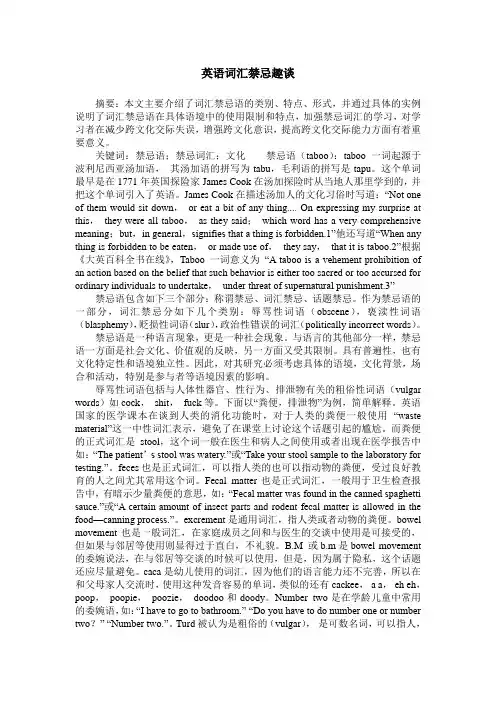
英语词汇禁忌趣谈摘要:本文主要介绍了词汇禁忌语的类别、特点、形式,并通过具体的实例说明了词汇禁忌语在具体语境中的使用限制和特点,加强禁忌词汇的学习,对学习者在减少跨文化交际失误,增强跨文化意识,提高跨文化交际能力方面有着重要意义。
关键词:禁忌语;禁忌词汇;文化禁忌语(taboo):taboo一词起源于波利尼西亚汤加语,其汤加语的拼写为tabu,毛利语的拼写是tapu。
这个单词最早是在1771年英国探险家James Cook在汤加探险时从当地人那里学到的,并把这个单词引入了英语。
James Cook在描述汤加人的文化习俗时写道:“Not one of them would sit down,or eat a bit of any thing.... On expressing my surprise at this,they were all taboo,as they said;which word has a very comprehensive meaning;but,in general,signifies that a thing is forbidden.1”他还写道“Whe n any thing is forbidden to be eaten,or made use of,they say,that it is taboo.2”根据《大英百科全书在线》,Taboo 一词意义为“A taboo is a vehement prohibition of an action based on the belief that such behavior is either too sacred or too accursed for ordinary individuals to undertake,under threat of supernatural punishment.3”禁忌语包含如下三个部分:称谓禁忌、词汇禁忌、话题禁忌。
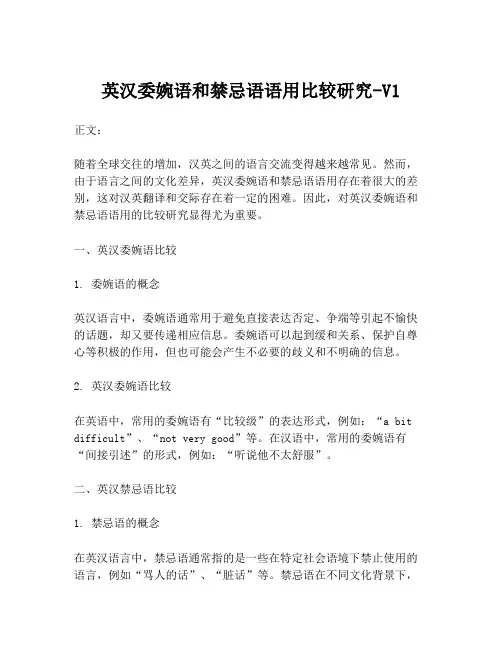
英汉委婉语和禁忌语语用比较研究-V1正文:
随着全球交往的增加,汉英之间的语言交流变得越来越常见。
然而,由于语言之间的文化差异,英汉委婉语和禁忌语语用存在着很大的差别,这对汉英翻译和交际存在着一定的困难。
因此,对英汉委婉语和禁忌语语用的比较研究显得尤为重要。
一、英汉委婉语比较
1. 委婉语的概念
英汉语言中,委婉语通常用于避免直接表达否定、争端等引起不愉快的话题,却又要传递相应信息。
委婉语可以起到缓和关系、保护自尊心等积极的作用,但也可能会产生不必要的歧义和不明确的信息。
2. 英汉委婉语比较
在英语中,常用的委婉语有“比较级”的表达形式,例如:“a bit difficult”、“not very good”等。
在汉语中,常用的委婉语有“间接引述”的形式,例如:“听说他不太舒服”。
二、英汉禁忌语比较
1. 禁忌语的概念
在英汉语言中,禁忌语通常指的是一些在特定社会语境下禁止使用的语言,例如“骂人的话”、“脏话”等。
禁忌语在不同文化背景下,
其表达方式和表现力也有很大的差别。
2. 英汉禁忌语比较
在英语中,禁忌语属于一种口语化的表达方式,而在汉语中,禁忌语的使用属于一种文化上的禁忌,常常与道德与文化价值观有关。
结论:
经过英汉委婉语和禁忌语语用比较研究,我们发现,英汉语言之间存在很大的差异。
对于翻译和交际,我们需要注意语言和文化之间的差异,学习和掌握不同文化背景下的语言使用方式,才能够更好地促进英汉之间的交流和理解。
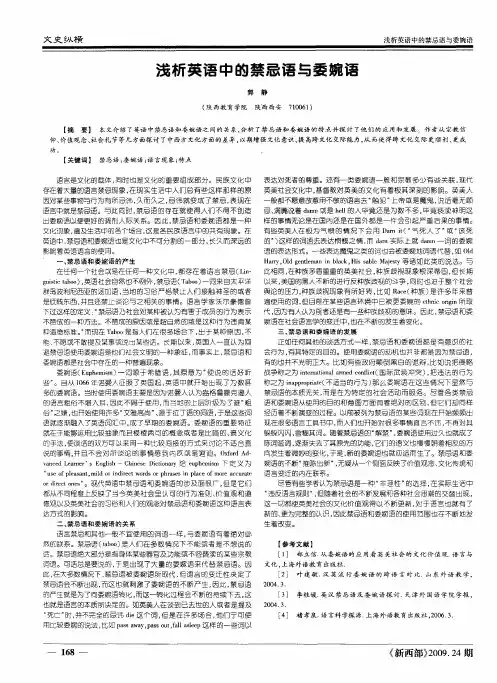
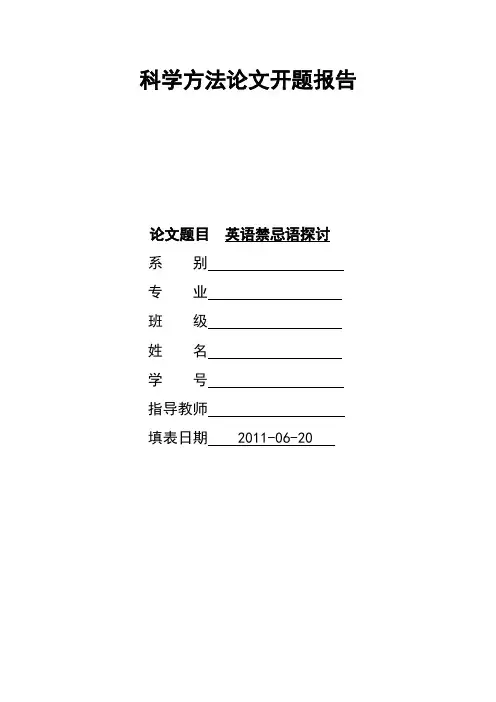
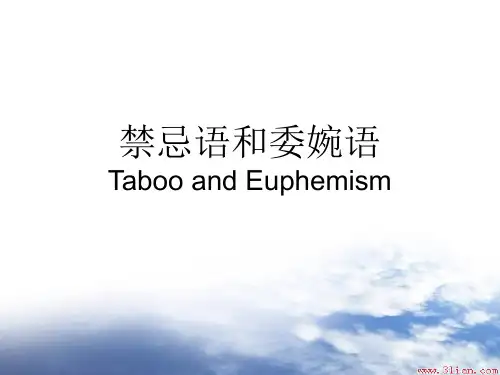
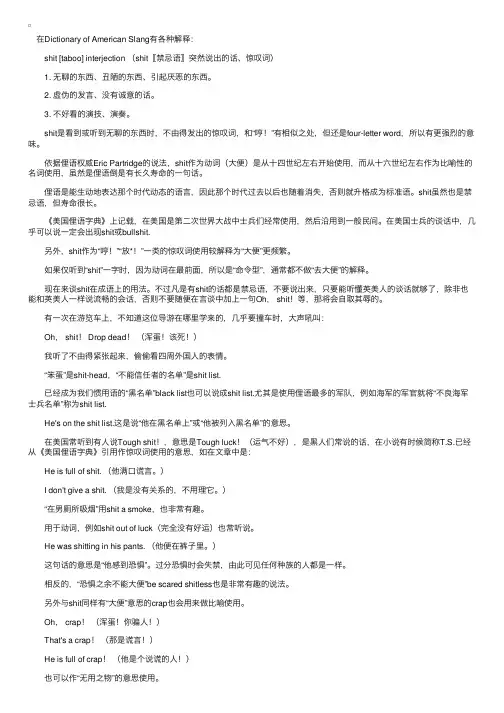
在Dictionary of American Slang有各种解释: shit [taboo] interjection (shit〖禁忌语〗突然说出的话、惊叹词) 1. ⽆聊的东西、丑陋的东西、引起厌恶的东西。
2. 虚伪的发⾔、没有诚意的话。
3. 不好看的演技、演奏。
shit是看到或听到⽆聊的东西时,不由得发出的惊叹词,和“哼!”有相似之处,但还是four-letter word,所以有更强烈的意味。
依据俚语权威Eric Partridge的说法,shit作为动词(⼤便)是从⼗四世纪左右开始使⽤,⽽从⼗六世纪左右作为⽐喻性的名词使⽤,虽然是俚语倒是有长久寿命的⼀句话。
俚语是能⽣动地表达那个时代动态的语⾔,因此那个时代过去以后也随着消失,否则就升格成为标准语。
shit虽然也是禁忌语,但寿命很长。
《美国俚语字典》上记载,在美国是第⼆次世界⼤战中⼠兵们经常使⽤,然后沿⽤到⼀般民间。
在美国⼠兵的谈话中,⼏乎可以说⼀定会出现shit或bullshit. 另外,shit作为“哼!”“放*!”⼀类的惊叹词使⽤较解释为“⼤便”更频繁。
如果仅听到“shit”⼀字时,因为动词在最前⾯,所以是“命令型”,通常都不做“去⼤便”的解释。
现在来谈shit在成语上的⽤法。
不过凡是有shit的话都是禁忌语,不要说出来,只要能听懂英美⼈的谈话就够了,除⾮也能和英美⼈⼀样说流畅的会话,否则不要随便在⾔谈中加上⼀句Oh, shit!等,那将会⾃取其辱的。
有⼀次在游览车上,不知道这位导游在哪⾥学来的,⼏乎要撞车时,⼤声吼叫: Oh, shit! Drop dead!(浑蛋!该死!) 我听了不由得紧张起来,偷偷看四周外国⼈的表情。
“笨蛋”是shit-head,“不能信任者的名单”是shit list. 已经成为我们惯⽤语的“⿊名单”black list也可以说成shit list.尤其是使⽤俚语最多的军队,例如海军的军官就将“不良海军⼠兵名单”称为shit list. He's on the shit list.这是说“他在⿊名单上”或“他被列⼊⿊名单”的意思。
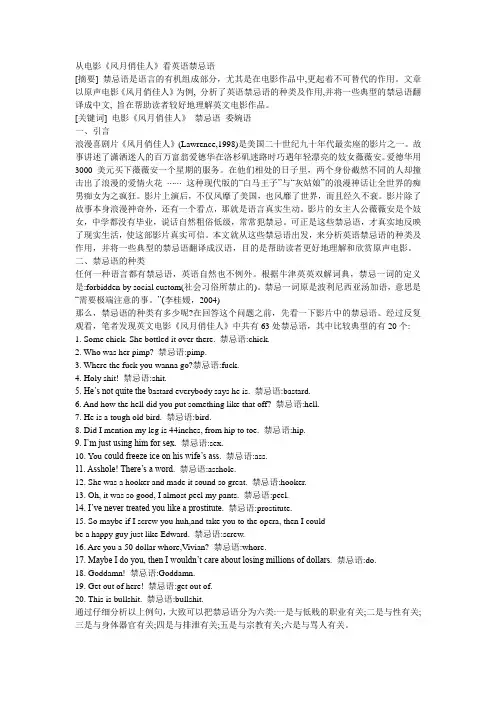
从电影《风月俏佳人》看英语禁忌语[摘要] 禁忌语是语言的有机组成部分,尤其是在电影作品中,更起着不可替代的作用。
文章以原声电影《风月俏佳人》为例, 分析了英语禁忌语的种类及作用,并将一些典型的禁忌语翻译成中文, 旨在帮助读者较好地理解英文电影作品。
[关键词] 电影《风月俏佳人》禁忌语委婉语一、引言浪漫喜剧片《风月俏佳人》(Lawrence,1998)是美国二十世纪九十年代最卖座的影片之一。
故事讲述了潇洒迷人的百万富翁爱德华在洛杉矶迷路时巧遇年轻漂亮的妓女薇薇安。
爱德华用3000美元买下薇薇安一个星期的服务。
在他们相处的日子里,两个身份截然不同的人却撞击出了浪漫的爱情火花⋯⋯这种现代版的“白马王子”与“灰姑娘”的浪漫神话让全世界的痴男痴女为之疯狂。
影片上演后,不仅风靡了美国,也风靡了世界,而且经久不衰。
影片除了故事本身浪漫神奇外,还有一个看点,那就是语言真实生动。
影片的女主人公薇薇安是个妓女,中学都没有毕业,说话自然粗俗低级,常常犯禁忌。
可正是这些禁忌语,才真实地反映了现实生活,使这部影片真实可信。
本文就从这些禁忌语出发,来分析英语禁忌语的种类及作用,并将一些典型的禁忌语翻译成汉语,目的是帮助读者更好地理解和欣赏原声电影。
二、禁忌语的种类任何一种语言都有禁忌语,英语自然也不例外。
根据牛津英英双解词典,禁忌一词的定义是:forbidden by social custom(社会习俗所禁止的)。
禁忌一词原是波利尼西亚汤加语,意思是“需要极端注意的事。
”(李桂媛,2004)那么,禁忌语的种类有多少呢?在回答这个问题之前,先看一下影片中的禁忌语。
经过反复观看,笔者发现英文电影《风月俏佳人》中共有63处禁忌语,其中比较典型的有20个:1. Some chick. She bottled it over there. 禁忌语:chick.2. Who was her pimp? 禁忌语:pimp.3. Where the fuck you wanna go?禁忌语:fuck.4. Holy shit! 禁忌语:shit.5. He’s not quite the bas tard everybody says he is. 禁忌语:bastard.6. And how the hell did you put something like that off? 禁忌语:hell.7. He is a tough old bird. 禁忌语:bird.8. Did I mention my leg is 44inches, from hip to toe. 禁忌语:hip.9. I’m just using him for sex. 禁忌语:sex.10. You c ould freeze ice on his wife’s ass. 禁忌语:ass.11. Asshole! There’s a word. 禁忌语:asshole.12. She was a hooker and made it sound so great. 禁忌语:hooker.13. Oh, it was so good, I almost peel my pants. 禁忌语:peel.14. I’ve never treated you like a prostitute. 禁忌语:prostitute.15. So maybe if I screw you huh,and take you to the opera, then I couldbe a happy guy just like Edward. 禁忌语:screw.16. Are you a 50 dollar whore,Vivian? 禁忌语:whore.17. Maybe I do you, then I wouldn’t care about losing millions of dollars. 禁忌语:do.18. Goddamn! 禁忌语:Goddamn.19. Get out of here! 禁忌语:get out of.20. This is bullshit. 禁忌语:bullshit.通过仔细分析以上例句,大致可以把禁忌语分为六类:一是与低贱的职业有关;二是与性有关;三是与身体器官有关;四是与排泄有关;五是与宗教有关;六是与骂人有关。
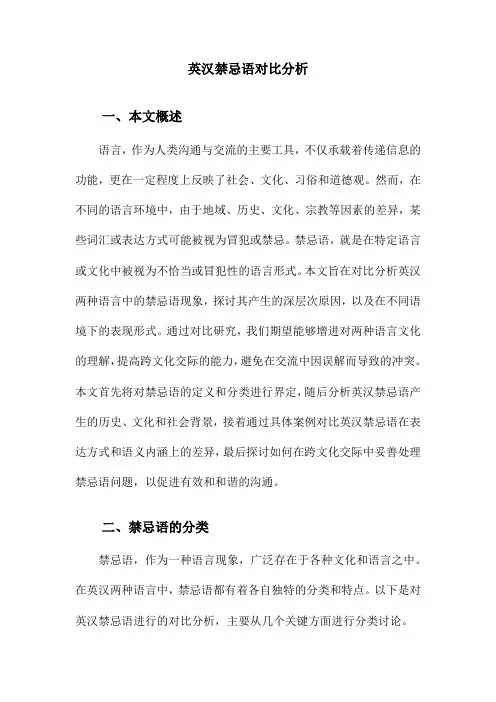
英汉禁忌语对比分析一、本文概述语言,作为人类沟通与交流的主要工具,不仅承载着传递信息的功能,更在一定程度上反映了社会、文化、习俗和道德观。
然而,在不同的语言环境中,由于地域、历史、文化、宗教等因素的差异,某些词汇或表达方式可能被视为冒犯或禁忌。
禁忌语,就是在特定语言或文化中被视为不恰当或冒犯性的语言形式。
本文旨在对比分析英汉两种语言中的禁忌语现象,探讨其产生的深层次原因,以及在不同语境下的表现形式。
通过对比研究,我们期望能够增进对两种语言文化的理解,提高跨文化交际的能力,避免在交流中因误解而导致的冲突。
本文首先将对禁忌语的定义和分类进行界定,随后分析英汉禁忌语产生的历史、文化和社会背景,接着通过具体案例对比英汉禁忌语在表达方式和语义内涵上的差异,最后探讨如何在跨文化交际中妥善处理禁忌语问题,以促进有效和和谐的沟通。
二、禁忌语的分类禁忌语,作为一种语言现象,广泛存在于各种文化和语言之中。
在英汉两种语言中,禁忌语都有着各自独特的分类和特点。
以下是对英汉禁忌语进行的对比分析,主要从几个关键方面进行分类讨论。
在英汉两种文化中,宗教都是重要的组成部分。
因此,与宗教相关的禁忌语也格外显著。
在汉语中,佛教和道教的宗教用语和象征都有严格的禁忌,如不得随意提及佛祖、道祖的名字,以及与之相关的神圣事物。
而在英语中,基督教的影响深远,涉及上帝、耶稣等神圣名词的言论都需要谨慎处理,以避免冒犯信仰者。
社会禁忌语主要涉及与社会习俗、道德规范等相关的内容。
在汉语中,对长辈、权威人物的称呼和言论有着严格的规范,如不得直接称呼长辈的名字,以及避免使用贬低或侮辱性的词汇。
而在英语中,虽然表达方式有所不同,但对性别、年龄、种族、社会地位等敏感话题的讨论也需要谨慎,避免引起不必要的冲突和误解。
习俗禁忌语是指与特定文化习俗相关的禁忌用语。
在汉语中,许多与死亡、疾病等相关的词汇都被视为禁忌,如“死”字常常用“去世”“走了”等委婉语代替。
在英语中,同样存在类似的习俗禁忌,如对于死亡的表述,人们更倾向于使用“pass away”“departed”等委婉说法。
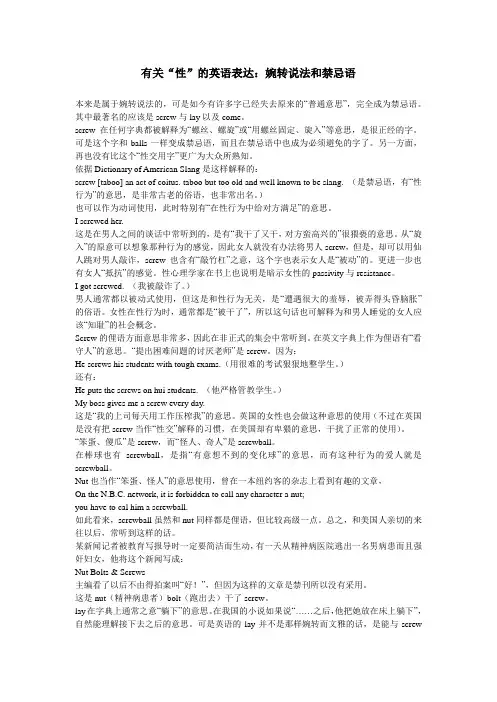
有关“性”的英语表达:婉转说法和禁忌语本来是属于婉转说法的,可是如今有许多字已经失去原来的“普通意思”,完全成为禁忌语。
其中最著名的应该是screw与lay以及come。
screw在任何字典都被解释为“螺丝、螺旋”或“用螺丝固定、旋入”等意思,是很正经的字。
可是这个字和balls一样变成禁忌语,而且在禁忌语中也成为必须避免的字了。
另一方面,再也没有比这个“性交用字”更广为大众所熟知。
依据Dictionary of American Slang是这样解释的:screw [taboo] an act of coitus. taboo but too old and well known to be slang. (是禁忌语,有“性行为”的意思,是非常古老的俗语,也非常出名。
)也可以作为动词使用,此时特别有“在性行为中给对方满足”的意思。
I screwed her.这是在男人之间的谈话中常听到的,是有“我干了又干,对方蛮高兴的”很猥亵的意思。
从“旋入”的原意可以想象那种行为的感觉,因此女人就没有办法将男人screw,但是,却可以用仙人跳对男人敲诈,screw也含有“敲竹杠”之意,这个字也表示女人是“被动”的。
更进一步也有女人“抵抗”的感觉。
性心理学家在书上也说明是暗示女性的passivity与resistance。
I got screwed. (我被敲诈了。
)男人通常都以被动式使用,但这是和性行为无关,是“遭遇很大的羞辱,被弄得头昏脑胀”的俗语。
女性在性行为时,通常都是“被干了”,所以这句话也可解释为和男人睡觉的女人应该“知耻”的社会概念。
Screw的俚语方面意思非常多,因此在非正式的集会中常听到。
在英文字典上作为俚语有“看守人”的意思。
“提出困难问题的讨厌老师”是screw。
因为:He screws his students with tough exams.(用很难的考试狠狠地整学生。
)还有:He puts the screws on hui students. (他严格管教学生。
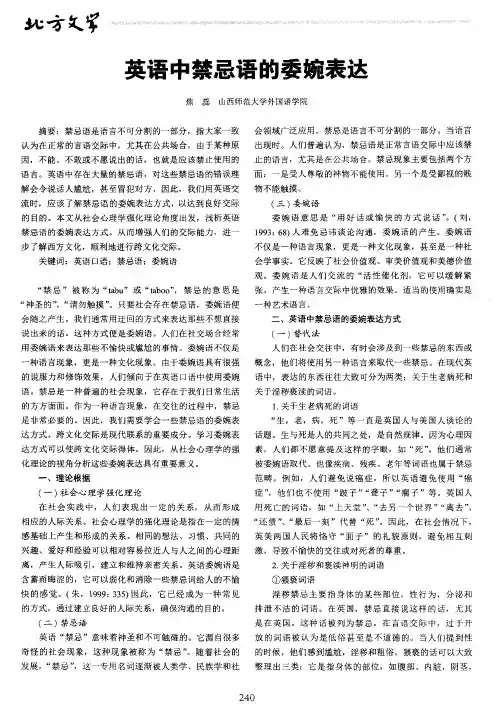
英语教学中不可忽略的文化禁忌作者:张公志来源:《决策探索·下旬刊》 2012年第5期随着社会的发展及国家间的经济文化交流日益频繁,英语学习的重要性也彰显出来。
然而人们在学习英语的过程中往往只重视语言的学习而忽略了英美文化教育,尤其是英美文化中的禁忌,而这些禁忌在跨文化交际中至关重要。
现在很多学校都请了外籍教师,在同外籍教师的交谈中我们了解到他们对学生的语言并不怀疑,让他们尴尬的事情往往是学生谈话的内容涉及了他们文化的禁忌,而学生们却一无所知。
现在笔者将英美文化中的禁忌稍作介绍,以便于英语学习者更好地了解英语和英美文化。
禁忌就是那些因传统习惯或社会风俗等原因应避免使用的词语或忌讳的行为。
如:英语国家忌数字13。
据《圣经》记载,在最后的晚餐上,出卖耶稣的犹大是餐桌上的第13 人,因此13 是个主凶的数字。
英语国家的饭店里没有13 号房间,请客忌讳13 人,重要活动避开每月的13 日。
禁忌几乎无处不在,这里只把那些跨文化交际中至关重要的禁忌加以介绍。
一、社交禁忌在英语国家,拜访某人需事先预约,忌突然造访。
否则,受访者会感到不快,因为这突如其来的拜访会打乱对方的工作安排,给对方造成极大的不便。
约好的拜访一般要准时,但习惯上,尤其是宴请或聚会,美国人习惯晚3~5分钟到达,晚10 分钟也是没有问题的,这是为了给女主人一点换衣化妆的时间。
另外,英语国家有用鲜花送礼的习惯,其中也有一些禁忌。
首先,送花忌送双数,因为双数的花会招来厄运。
也忌讳送白色的花,如白色百合花,被看作是厄运的预兆或死亡的象征。
除此之外,给医院的病人送花忌送白色或红白相间的花。
二、隐私禁忌在英语中有句谚语,意思是:一个人的家是神圣不可侵犯的,未经许可,不得入内。
其实,个人的事也是这样,不想让别人知道,更不愿让别人干预。
询问关于个人的年龄、财产、工资收入、婚姻、恋爱、宗教信仰、政治倾向等私事,即是用另一种方式侵犯了别人的“城堡”。
因此诸如“Howoldare you?”等这类问题是必须避免问的。
中国外语类核心期刊CSSCl2000年度入选刊物《中文社会科学引文索引》源刊WAIYU XUEKANFOREIGN LANGUAGES RESEARCH 2003.5中英文禁忌语之异同及文化内涵李景艳(哈尔滨工业大学,哈尔滨150001)提要:在跨文化交际中,有些词语因传统习惯或社会风俗不同,会引起对方强烈反感,应避免使用,这就是禁忌语。
然而,各国人民所忌讳的行为和词语并不一致,了解这些差异对于学习外语或对外交流的人来说至关重要。
因此本文采用对比手法全方位地阐述禁忌语,作为一种世界各民族共有的社会现象,它的概念、产生和发展、它所具有的时代性以及它在社会某些领域和方方面面的表现。
旨在通过这些论述透视中英语系的不同、社会和文化的差异以及禁忌语的存在促进了语言的发展,丰富了英语词汇这一不争的事实。
关键词:禁忌语;宗教;歧视;忌讳:文化内涵中圈分类号:HO-05 文献标识码:A 文章编号:1000—0100(2003)05—0015—04 1.禁忌语的概念英语taboo一词的含义是禁忌,也有人将其译为“塔布”。
在中文里禁忌即是指“犯忌讳的话或行动”,其近义词还有忌讳、顾忌、避讳、避忌等。
忌讳有两个解释;一为“因风俗习惯或个人理由等,对某些言语或举动有所顾忌,积久成为禁忌”,二为“对某些可能产生不利后果的事力求避免”,顾忌则指“恐怕对人或对事情不利而有所顾虑”。
避讳也有两个解释:一是“封建时代为了维护等级制度的尊严,说话、写文章时遇到君主或尊亲的名字都不直接说出或写出,叫避讳”;二是指“不愿说出或听到某些会引起不愉快的字眼”。
避忌则与避讳同义。
从以上中文各条目的解释(均取自《现代汉语词典》)可以归纳出英文taboo的综合含义是“在一定的社会条件下,由于无知、迷信或社会文化的需要,人们被禁止说某些话,做某些事,使用某些器物,进人某些地区或见某些人等”。
这里所说的“被禁止说某些话”,这些话就是禁忌语。
比如,中国古代的帝王,位及至尊,其名字便是禁忌语,避免说出帝王的名字就是避讳。
英语禁忌语的特点及成因作者:李小兰来源:《精品·学术》2018年第07期摘要:禁忌语在英语交际中起着重要作用,因此在交际中正确认识和使用禁忌语才能使交际更加顺畅,减少文化冲突和误会。
本文着重分析英语禁忌语的特点和成因,期望帮助使用者避免由于禁忌语使用不当而带来的困扰,达到有效交流的目的。
关键词:西方文化;英语禁忌语;特点;成因1引言禁忌语属于一种广泛存在的语言现象,比如说,cock(公鸡),shit(屎,粪便),tits (以牙还牙),fat(肥胖)以及die(死亡)等词汇在英语当中都属于禁忌语,因而,学习和了解英语禁忌语的使用特点在东西方文化交流过程当中,能够有助于人们彼此之间在了解和尊重的基础之上进行沟通和交流。
2英语禁忌语的特点2.1民族性作为一种语言现象,禁忌语是世界各民族所共有的文化现象,英语禁忌语(English taboo language)的出现和存在是不同民族和地区人们的心理特征的一种体现。
例如,英国人们由于受到清教徒的影响,大部分人具有守旧的思想,在英国人的心目当中,他们比较忌讳跟“性(sex)”相关的cunt(阴道),fuck(性交)以及piss(尿)等词汇。
又如对于中国的人们来说,“死亡(death)”是一个比较忌讳的词语,对于人们来说往往都带有着不吉利的预兆,因此在交往的过程中,对于这种不吉利的词语大家都是比较避讳的。
又如,俄罗斯人忌讳黑猫(The black Cat),在这种情况下,倘若一只黑猫从你的前面跑过,最好停下来选择走另一条路,因为对于俄罗斯人来说,在路上遇到黑猫就意味着前方路上有“不干净”的东西,因此需要绕道而行。
还有,在日本人的心目中,荷花代表着丧花,因此在探望病人时不能用同荷花颜色一样或颜色相近的花种。
由此可见,禁忌语带有民族性的特点。
2.2时代性通常来说,英国人们在使用禁忌语言的过程当中,存在着一定的相对性成分。
虽然这种禁忌语言在人们沟通或交流的过程当中,往往会使人们对其有所避讳。
英语口语:英文口语的禁忌:这些话打死也不能说1、You've put on weight. 你貌似胖了。
以“纸片人”为美的今天,说别人变胖绝对属于找虐的节奏,除非是和你无话不谈、不损两句就不算关系铁的好闺蜜。
又或者,你是出于对小辈的关心和好意提醒,但也要切记用疑问句“Have you just put on weight?”。
当然如果你是想说TA身材变健壮,能够直接以“最近是不是去了健身房”来代替。
另外,千万千万别说“You're getting fat”,这是难以置信的侮辱。
2、Oh you're pregnant! 你怀孕了!可能跟国内情况相反,外国两类人最讨厌被让座,即老人和胖子。
他们会因为感觉被当成弱者对待而很气愤,更别提聊天的时候提到!“怀孕”这个话题除非是很明显,否则不要刻意提出来。
就算有千万个问号在心中咆哮,也不要脱口而出这个句!如果错误已经造成,就等着友尽吧。
3、Is this your daughter? 这是你闺女吗?嗯。
万一她是他的女朋友怎么办?万一他们是兄妹、姐妹怎么办?这也涉及到交际中的一大禁忌:避免揣测关系,只能等人家来介绍或是自我介绍一下自己。
当然,很多时候当我们用母语交流,这些问题可能根本不会触犯,而当我们用英语交流时,往往因为词穷或这是你最先能想到的话题而脱口而出。
4、Your sister is so much prettier than you. 你姐妹比你漂亮好多哦。
又一个讨打的说法。
在一些文化里似乎认为是一个无伤大雅的话,甚至会被认为是恭维,但更多时候会伤害到听者的感受。
的是,避免比较性词语,只要提到他们的姐妹很漂亮就好啦。
5、That color doesn't suit you. 你不适合那个颜色。
请记住,不管对方打扮得让你多么毁三观,一定要先夸TA。
出于好意地提出自己意见能够用稍婉转的方式:“I love your dress, butdon't you think this color...”一上来就做负面的评论或许会破坏了那个人一天的好心情,尤其是他们已经在装扮上花费很多时间。
学 年 论 文 学生姓名 常玉杰 学 号 020701039 院 (系) 外国语学院 专 业 英语(师范) 题 目 英汉文化中禁忌语差异的研究 Title On Cultural Difference of the Taboo Words Between English and Chinese
指导教师 陈维平 副教授 (姓 名) (专业技术职称/学位)
2010 年 11 月 淮阴师范学院学年论文
ii On Cultural Difference of the Taboo Words between English and Chinese
By Chang Yujie
A Thesis Submitted to School of Foreign Languages as a Gaduation Tesis At Huaiyin Normal University
Under the Supervision of Ms. Chen Weiping
September 2010 淮阴师范学院学年论文
iii Acknowledgements This thesis involves much generous assistance from my teachers, friends and parents. I would like to offer my heartfelt thanks to my instructor Chen Weiping, my supervisor, who has been giving me the considerable academic help and constant support during my thesis writing. I also extend my heartfelt appreciations to all of my friends and especially, my classmate Qi Jianhui, who has spent time discussing questions with me and offered me kind advice about the thesis. And I would like to thank the librarians of Huaiyin Teachers College, who have provided me with useful references needed in my thesis.
Finally, I would like to present sincere thanks to my parents, who have supported and assisted me all the way in my college life. 淮阴师范学院学年论文
iv 摘要:语言是文化的载体,不同的社会背景和历史文化会产生出不同的禁忌语言。在原始社会,自然灾害频发,又由于当时人们的封闭的思想,因而变得很迷信,他们认为语言本身会带来不同的运气,因而就有禁忌语这一说法。禁忌语在中国和其他许多说英语的国家的应用有着许多相似之处,本文首先对禁忌语的起源进行了概述,再从其发展过程进行分析。在人们日常生活的方方面面,都会涉及到禁忌语,所以它在中国和英语的国家是一个普遍存在的社会现象。他们在某些方面存在着相同点,也在不同的社会习俗和文化背景的影响下,呈现出不同的形式。最后,在日常生活中,人们逐渐运用委婉语来替代禁忌语,以避免因误用所造成的麻烦,通过这种方式,我们可以更加有效的与别人进行交流。
关键词:禁忌语,对比分析,文化差异,委婉语 Abstract:Culture can be manifested in certain language. Different social background and historical culture make a contribution to produce different linguistic taboos. As the old saying goes, “Troubles come out of the tongue”. Superstitious people think that the language itself can bring about fortune and 淮阴师范学院学年论文 v misfortune so that taboos are created. Taboos are in common use in China and many English speaking countries, and we can find its expression in English and Chinese. This paper gives a brief introduction of the origin of taboos. And then analyzes its evolution process. People can be aware of the fact that linguistic taboos exist in almost every aspect of their daily life, and it is an universal social phenomenon in China and Britain. They share some similarities in certain aspects. Nevertheless, under the influence of different social customs and culture backgrounds, they take on different forms. To avoid the unnecessary troubles caused by misusing taboos, we replace it with euphemisms. Then we can communicate with each other effectively.
Key words:taboo words, comparison ,similarities, cultural difference, euphemism 淮阴师范学院学年论文
vi CONTENTS 1. Introduction ....................................................................... 错误!未定义书签。 2. Analysis of Gender Differences in College English Education in China错误!未定义书签。
3.1 The phenomena of gender differences .......................... 错误!未定义书签。 3.1.1 Female students are more than male students in English department .. 错误!未定义书签。 3.1.2 Female students get higher achievement than male students in English learning ................................................................. 错误!未定义书签。 3.2 Analysis of the factors in gender differences ................ 错误!未定义书签。 3.2.1 Physiological gender differences in language learners . 错误!未定义书签。 3.2.2 Emotional and psychological gender differences in language learners 错误!未定义书签。 淮阴师范学院学年论文 vii 3.2.3 The influence of family education ........................ 错误!未定义书签。 3.2 4 The influence of school education ........................ 错误!未定义书签。 3.2.5 The influence of traditional society ...................... 错误!未定义书签。 4. Enlightenment of Gender Differences in College English Education错误!未定义书签。
4.1 Influence caused by gender differences in college English education错误!未定义书签。 4.2 Revealing gender inequality in education in China ...... 错误!未定义书签。 5. Synthetic Ways to Achieve Gender Equality in Education错误!未定义书签。
5.1 Enact education policies ............................................... 错误!未定义书签。 5.1.1 Incorporate gender equality into school education错误!未定义书签。 5.1.2 Incorporate gender equality into college and university admission policies ................................................................. 错误!未定义书签。 5.2 Incorporate gender equality into textbooks .................. 错误!未定义书签。 5.3 Teaching by gender ....................................................... 错误!未定义书签。 5.3.1 Changing gender stereotypes by teachers ............. 错误!未定义书签。 5.3.2 Classroom teaching by teachers ............................ 错误!未定义书签。 6. Conclusion .......................................................................... 错误!未定义书签。 Works Cited ........................................................................... 错误!未定义书签。